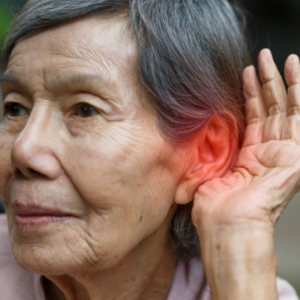Music to My Ears!

Hearing difficulty has long been regarded as a common and somewhat accepted outcome of aging. Yet, the detrimental effects of hearing loss on health and wellbeing should not be underestimated. Hearing loss is a major contributing factor to social isolation and is the largest modifiable risk factor in developing dementia, exceeding that of smoking, high blood pressure and lack of exercise. Hearing loss is also associated with more frequent hospitalizations and poorer health outcomes in general. The National Institute on Aging reports that one in three adults aged 65-74 has hearing loss, and nearly half of those aged 75+ have difficulty with hearing. However, among our increasingly “plugged in” generation, hearing is also starting to affect a significant number of people earlier in life. A 2011 study on the epidemiology of hearing loss documented hearing loss in 11% of participants aged 45-54, and 25% of those aged 55-64.
Age-related hearing loss is insidious; and we may not always be aware of the changes that are happening. As we age, special cells in our inner ear no longer respond to sounds and this affects our ability to hear high frequency sounds clearly. Lower frequency sounds are usually preserved, so it is common to think that other people are not speaking clearly or are mumbling. The reality is that we ourselves are in fact experiencing a loss of hearing range. As hearing difficulties progress, it becomes harder for the brain to process sound and understand what is being said. The increased energy utilization the brain needs to hear negatively affects its ability to perform other cognitive tasks, including memory and recall. The old adage “if you don’t use it, you lose it” applies here. So, addressing hearing issues proactively will go a long way in preserving brain health.
Evaluating most age-related hearing loss first requires a visit to your primary care provider (PCP). Providing there are no medical contraindications, your PCP may remove earwax and/ or make a referral to an ENT specialist to do so. Once wax is removed and if the hearing difficulties are still evident, a referral is made to an audiologist for an in-depth hearing evaluation. After testing, an audiologist will determine if you are a candidate for hearing aids and can make the appropriate recommendations. It will usually take a few visits to the audiologist to fine tune hearing adjustments so that the aides help you hear better with less effort. You will also be taught adaptations to control for background noise. Lately, with so many advances being made in hearing technology, there has been advocacy to gain more affordable access to hearing care. For many years, the sale of hearing aids was restricted to licensed audiologists and other professionals which, while ensuring high quality and excellent service, kept prices high. In October of 2022, the FDA finally approved the sale of over the counter hearing aids and provided regulatory guidelines. A variety of hearing technology companies are now entering into this new market which should help lower prices. While it will take time for the dust to settle, the environment is changing to make access to hearing health easier and more affordable for everyone. Now that is music to my ears!
For more information on Hearing Loss and what you can do about it:
Hearing Loss Association of America
National Institute on Deafness and Other Communication Disorders
Anne C. Sansevero RN, MA, GNP, CCM
Aging Life Care ® Professional
Founder & CEO
HealthSense LLC
![HealthSense [logo]](https://www.health-sense.org/wp-content/uploads/sites/242/2017/02/logoNEW.png)